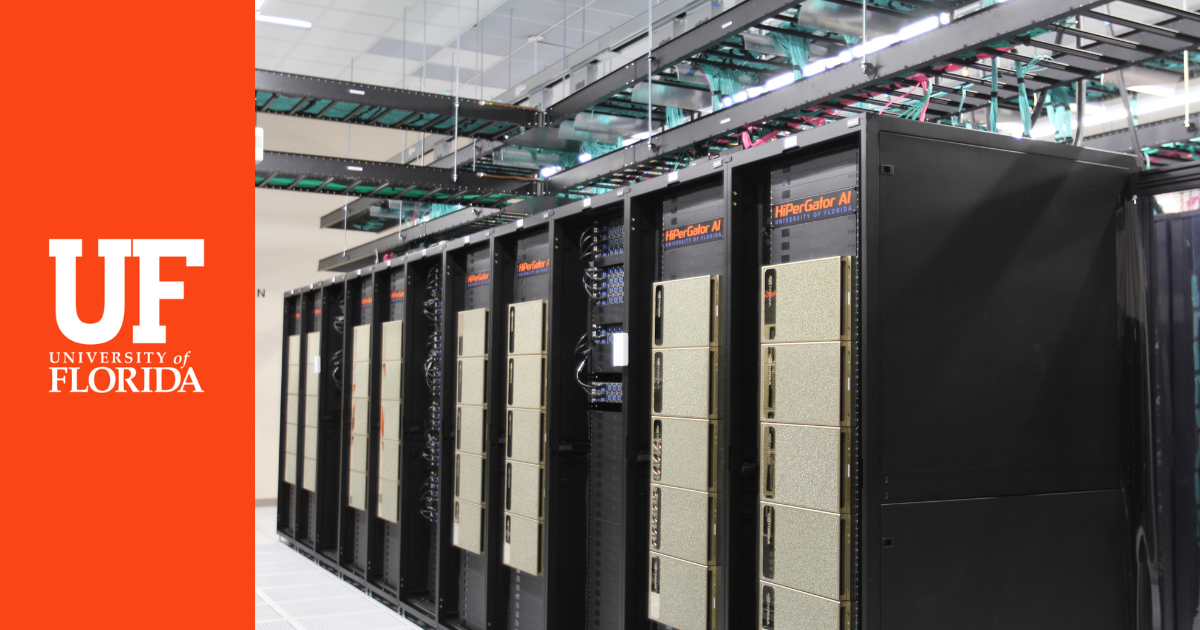The University of Florida is poised to revolutionize the landscape of AI education and research with the launch of its fourth-generation HiPerGator supercomputer. Equipped with advanced AI capabilities powered by NVIDIA's cutting-edge Blackwell GPUs, this development marks a significant milestone, positioning the university at the forefront of AI innovation in the United States.
Unprecedented AI Capabilities
The HiPerGator supercomputer's integration of NVIDIA's Blackwell GPUs promises to deliver unprecedented computational power, facilitating groundbreaking research and educational opportunities. As the first of its kind in the U.S., this technological leap is expected to enhance the university's ability to conduct complex simulations and process vast datasets with remarkable speed and efficiency.
In a statement, a university spokesperson emphasized the transformative potential of this initiative, noting,
"The new HiPerGator supercomputer will not only elevate our research capabilities but also provide our students with unparalleled access to cutting-edge AI tools, preparing them to lead in the rapidly evolving tech landscape,"underscoring the strategic importance of this development in shaping future AI leaders.
Implications for Academic Integrity and Ethics
While the advancements in AI technology at the University of Florida are poised to offer significant educational benefits, they also raise pressing questions about academic integrity and ethical considerations. The deployment of such powerful AI tools necessitates rigorous oversight to prevent misuse and ensure that the technology is harnessed responsibly within academic settings.
Experts caution that without comprehensive regulatory frameworks and ethical guidelines, the integration of AI into educational processes could lead to unintended consequences, including potential breaches of academic integrity and challenges in maintaining equitable access to these advanced resources.
Broader Societal Impacts
The implications of the HiPerGator supercomputer extend beyond the academic sphere, with potential ripple effects across various sectors. By spearheading AI advancements, the University of Florida is not only contributing to the academic community but also setting a precedent for other institutions to follow. This could accelerate the adoption of AI technologies in diverse fields, from healthcare to environmental science, ultimately reshaping societal norms and expectations.
As the University of Florida prepares to unveil this pioneering supercomputer, the broader educational and societal impacts of such technological advancements remain a focal point of discussion among policymakers, educators, and industry leaders.
Originally published at https://floridadaily.com/latest-update-to-university-of-florida-supercomputer-will-reshape-ai-education-research/
ResearchWize Editorial Insight
The University of Florida's launch of the HiPerGator supercomputer is a game-changer for AI education and research. For students and researchers, this development means access to unprecedented computational power, enabling more complex simulations and data processing. This positions them to lead in the fast-paced tech world.
However, the integration of such advanced AI tools raises critical questions about academic integrity and ethics. Without proper oversight, there's a risk of misuse and inequitable access. Are universities prepared to handle these challenges?
The HiPerGator's impact isn't limited to academia. It sets a benchmark for other institutions, potentially accelerating AI adoption across sectors like healthcare and environmental science. This could reshape societal norms and expectations. How will this influence policy and regulation in AI technology?
The broader implications of this supercomputer highlight the need for balanced discussions among policymakers, educators, and industry leaders. The focus should be on harnessing AI's potential while mitigating risks. Are we ready for the societal shifts this technology could bring?
Looking Ahead
1. Rethinking Curriculum The launch of the HiPerGator supercomputer at the University of Florida highlights a pressing need: educational curriculums must evolve at the speed of technology. Are universities prepared to integrate AI into core subjects, or will they lag behind, offering outdated syllabi that fail to prepare students for an AI-driven world? Institutions must pivot quickly, crafting courses that blend technical prowess with ethical considerations, ensuring students are not just users, but responsible innovators.
2. Ethical Guardrails As AI capabilities expand, so do ethical dilemmas. With tools like HiPerGator, students can access unprecedented computational power, but what boundaries are in place to prevent misuse? Universities must establish robust ethical frameworks and oversight committees. Without this, we risk breeding a generation of technologists who excel in innovation but falter in ethical responsibility. What happens if we fail to instill a sense of accountability alongside technical acumen?
3. Accessibility and Equity The HiPerGator sets a new standard, but who gets access? If advanced AI education becomes a privilege of a few elite institutions, we risk widening the educational divide. Policymakers and educational leaders must advocate for equitable access to AI resources. Scholarships, partnerships, and public funding can ensure that the benefits of AI education are not confined to a select few. Will we rise to the challenge, or will AI become another tool of inequality?
4. Regulatory Frameworks The pace of AI development is relentless. Regulators are already struggling to keep up. What happens if they fall behind? Rapid advancements like the HiPerGator necessitate agile regulatory responses that can adapt to new challenges as they arise. Universities, in collaboration with policymakers, must lead the charge in crafting regulations that protect academic integrity while fostering innovation.
5. Cross-Disciplinary Integration AI is not just a tech subject—it's a transformative force across disciplines. From healthcare to environmental science, AI's potential is boundless. Universities must encourage cross-disciplinary projects, breaking down silos and fostering collaboration. Will educational institutions embrace this integration, or will they cling to outdated departmental structures?
As we stand on the precipice of an AI-driven future, the choices we make today will define our educational landscape tomorrow. The University of Florida's HiPerGator is just the beginning. Are we ready to seize the opportunity, or will we watch as it slips through our fingers?
Originally reported by https://floridadaily.com/latest-update-to-university-of-florida-supercomputer-will-reshape-ai-education-research/.
Related Articles
- President Trump signs executive order boosting AI in K-12 schools
- How ‘Everyone is welcome here’ sign controversy played out in Idaho
- Q&A: Centering people, advancing artificial intelligence with NSF CAREER award
📌 Take the Next Step with ResearchWize
Want to supercharge your studying with AI? Install the ResearchWize browser extension today and unlock powerful tools for summaries, citations, and research organization.
Not sure yet? Learn more about how ResearchWize helps students succeed.

